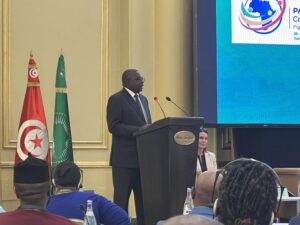Illicit financial flows: Africa loses some $220b annually in tax incentives

Most African countries give generous tax incentives to mostly foreign companies as a means of attracting needed investments into their countries, but these countries have been noted to be losing money through illicit financial flows (IFFs), including losing as much as $220 billion annually in tax incentives to businesses.
Speaking at the opening of the Pan African Conference on illicit financial flows and taxation in Africa in the Tunisian capital, Tunis, Albert Muchanga, Commissioner for Trade and Industry of the African Union Commission laying out the impact of illicit financial flows on Africa, said about $30 billion worth of gold is smuggled out of the continent every year. He indicated that the $220 billion that countries in Africa give as tax incentives to corporations could be illicit because public officials might have been bribed to grant the incentives.
He said some $275 billion annual outflows from Africa is through profit shifting by companies.
Mr Muchanga therefore urged African countries to strengthen customs systems to curtail trade misinvoicing which also contributes to illicit financial flows.
According to Mr Muchanga, commercial and tax related activities account for 65% of illicit financial flows in Africa, while crime accounts for 10% and corruption accounts for 5%.
He called for the strengthening of tax administration and auditing to eliminate the problem.
“Because of weak auditing, Africa loses $30 billion in gold exports,” he said, indicating that the UNCTAD puts Africa’s loss to illicit financial flows at $90 billion every year, adding that illicit financial flows cost some countries about 17% of their GDP, while in other countries it’s as much as 40% of GDP.
“IFFs are illegal capital flights. They are money lost through misinvoicing, tax avoidance and environmental crimes. Fighting IFFs is fighting criminals, and without fighting IFFs, there won’t be inclusive growth in Africa. Fighting IFFs is fighting for inclusive growth,” he said.
Mr Muchanga also called on African countries to use artificial intelligence in their efforts to eliminate IFFs.
In his presentation, Logan Wort, the Executive Director of the African Tax Administration Forum (ATAF) said Africa’s economy is not strong enough to match the volume of outflows.
“What has life been beyond the High Level Panel report? Who is leading the agenda, or we have just been repeating the report?” He asked.
Mr Wort who didn’t hold back, said it looks like Africans are blaming someone else for IFFs on the continent. “We have the capabilities to deal with it. But do we have the political will?” He asked.
“We need to take drastic action. We need to do more at a higher pace,” he said, then he asked: “What needs to be done? Whose agenda must it be?”
He also noted that 65% of IFFs come from the activities of multinational corporations and stated that with innovation from the Tax Justice Network Africa, countries should be able to monitor and track flows.
Mr Wort commended some 12 African countries for making progress with new transfer pricing policies.
“We can and must develop African tools to deal with IFFs,” he said.
On her part, Birgit Pickel, the Director-General for Africa in the Federal Ministry for Economic Cooperation and Development of Germany, pointed out the fact that IFFs pose security risks and undermine democracy.
She also said IFFs are used to finance terrorism, and reiterated the German government’s support to efforts in Africa to fight the problem, while admitting that Germany, and generally European countries are major recipients of IFFs.
The conference is being held from June 26 to 28, 2024 under the theme: “Africa’s Tax Agenda in Combatting Illicit Financial Flows: From Words to Action.”
By Emmanuel K Dogbevi, in Tunis, Tunisia.
Copyright ©2024 by NewsBridge Africa
All rights reserved. This article or any portion thereof may not be reproduced or used in any manner whatsoever without the express written permission of the publisher except for the use of brief quotations in reviews.
